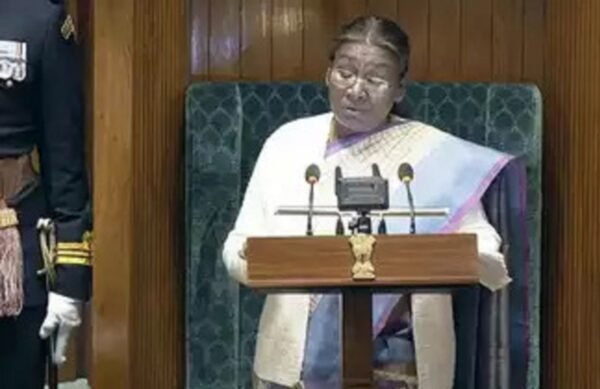Budget Session of Parliament has sparked significant political controversy?

The recent address by President Droupadi Murmu at the Budget Session of Parliament has sparked significant political controversy, particularly from the Indian National Congress.
Congress leaders, including President Mallikarjun Kharge, characterized the speech as a “clear-cut political speech” that failed to acknowledge pressing issues faced by citizens. Kharge expressed disappointment, suggesting that the address resembled a “BJP pamphlet” rather than a genuine reflection of the government’s priorities and responsibilities towards the public. Opposition members criticized the speech for being predictable and lacking substantive engagement with real societal challenges, calling for a “new tradition” in how such addresses are delivered.
The controversy intensified following Sonia Gandhi’s remarks about President Murmu’s delivery. After the address, she commented that the President seemed fatigued and could “hardly speak, poor thing,” which led to backlash from ruling party members and prompted a statement from Rashtrapati Bhavan condemning her comments as “unacceptable.” The statement emphasized that the President was not tired and was committed to advocating for marginalized communities during her speech. Prime Minister Narendra Modi and other BJP leaders accused Gandhi of insulting both the President and tribal communities, escalating tensions between the parties.
The incident has placed Congress on the defensive, with demands for an apology from Sonia Gandhi. BJP leaders have framed her comments as indicative of a broader disrespect toward tribal heritage and leadership. Meanwhile, Congress has dismissed these demands, arguing that they serve to distract from more pressing economic issues facing the country.
President Murmu’s address has not only drawn criticism for its content but has also ignited a fierce political exchange regarding respect for officeholders and accountability in governance.
The Economic Survey 2024-25, presented by Finance Minister Nirmala Sitharaman on January 31, 2025, provides a comprehensive analysis of India’s economic performance and outlook. Here are the key highlights:
Economic Growth and Projections
GDP Growth: India’s real GDP is projected to grow by 6.4% in FY25, driven primarily by the agriculture and services sectors. For FY26, GDP growth is expected to range between 6.3% and 6.8%.
Sector Performance:
Agriculture: Expected to grow by 3.8%, supported by strong Kharif production and rural demand.
Industry: Projected growth of 6.2%, although manufacturing faces challenges due to weak global demand.
Services: The fastest-growing sector, anticipated to expand by 7.2%, particularly in IT, finance, and hospitality.
Global Economic Context
The survey highlights a challenging global economic environment characterized by slow growth, geopolitical tensions, and trade protectionism. It notes that global trade has significantly slowed, with signs of potential stagnation emerging.
The dominance of China in manufacturing is acknowledged as a challenge, with the survey suggesting that the global outsourcing model is undergoing a reset due to recent economic upheavals.
Domestic Economic Indicators
Private Consumption: The share of private final consumption expenditure in GDP is projected to increase from 60.3% in FY24 to 61.8% in FY25, marking the highest level since FY03.
Inflation Trends: While headline inflation is moderating, food inflation has risen from 7.5% to 8.4%, influenced by supply chain disruptions and weather conditions.
Employment: The labor market shows improvements post-pandemic, with key metrics such as unemployment rate and labor force participation rate reflecting positive trends.
Recommendations and Strategic Focus
The Economic Survey emphasizes the need for:
Deregulation: Advocating for reduced regulatory barriers to stimulate economic growth.
Technological Adaptation: Addressing the challenges posed by AI and automation on employment, suggesting that robust institutions must be developed to manage these transitions effectively.
Infrastructure Development: Continued investment in urban infrastructure through initiatives like the Smart Cities Mission.
The Economic Survey 2024-25 presents a cautiously optimistic outlook for India’s economy, highlighting resilience amid global uncertainties while calling for strategic reforms to bolster growth and address emerging challenges.
